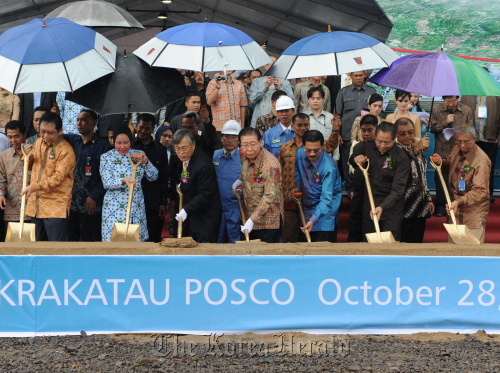CILEGON, Indonesia The world’s fourth-largest steelmaker POSCO began works on the site for its first overseas and Southeast Asia’s first integrated steelworks in Indonesia on Thursday.
“The project is very meaningful in that it allows us to secure leadership in Indonesia at a time when Japan is looking for overseas expansion opportunities,” POSCO chief executive Chung Joon-yang said at a conference held in Jakarta ahead of the groundbreaking ceremony.
“Expanding into Indonesia that has the largest growth potential in Southeast Asia also lets us prepare against China’s expansion into the region.”
The steelworks, located in Cilegon, 100 kilometers west of Jakarta, will be operated by PT. Krakatau POSCO, a joint venture between POSCO and Indonesia’s state-run steelmaker Krakatau Steel established on Sept. 27.
The joint venture is 70 percent owned by POSCO, but the agreement allows the Indonesian steelmaker to increase its stake to 45 percent once the plant’s operations are stabilized.
The works on the site are scheduled for completion on June 30 next year, and the company plans to begin the construction of the steelworks immediately once the site is ready with the aim of completing the first stage of the project by Dec. 31, 2013. The facility will initially be equipped to produce 3 million metric tons of steel on an annual basis.

POSCO chief executive Chung Joon-yang (fourth from left), Krakatau Steel head Fazwar Bujang (far right), Korean ambassador to Indonesia Kim Ho-young (third from left) and other officials shovel at the ground-breaking ceremony of the company’s steel plant in Cilegon, Indonesia, on Thursday. (POSCO)
Estimated to require an investment of $2.7 billion for the first stage, the project is the largest investment made by a foreign entity in Indonesia to date.
“I think Indonesia is an ideal location for overseas expansion as it has the highest growth potential in Asia where supply is still lagging behind the demand,” Chung said, adding that in Korea, China and Japan, which have led Asia’s steel industry, steelmakers’ capacities are overtaking the demand.
Once complete, the plant will produce 1.5 million tons of plates and an equal amount of slab on an annual basis.
“The demand (for thick plates) is rising, but it is not produced in Indonesia so 70 percent to 75 percent will be consumed locally, so (selling) 1.5 million tons of thick plates a year will pose no problems,” Chung said. Of the 1.5 million tons of slab produced, 1 million tons will be sold locally and the remainder exported to neighboring markets.
“Plans for the second stage of the project have not been finalized, and as there will be many changes in the next few years, we will be flexible in establishing downstream projects.”
According to plans, Krakatau POSCO’s production capacity will be doubled to 6 million tons at a later date.
According to POSCO, Indonesia offers a strategic base in terms of both market access and raw materials supply.
According to the company Indonesia has about 2.2 billion tons of iron ore and 93.4 billion tons of coal reserves, and the steelmaker is planning to take on natural resource development in collaboration with Krakatau Steel in its efforts to lower production costs and secure competitiveness.
“In order to secure additional competitiveness, we plan to operate a coal company and expand into other resources such as iron ore and nickel,” Chung said.
In addition, the company is hoping that Indonesia will provide a base for expanding into neighboring markets such as India, where the demand for steel products is rising.
Concerning other POSCO companies’ prospects in Indonesia, Chung said that subsidiaries including POSCO Engineering and Construction will be signing agreements regarding infrastructure development and low-carbon growth strategies.
Concerning the delays in the company’s plans in Vietnam, Chung said that POSCO’s cold rolling business in the country is doing very well.
“The Vietnamese government requested that we find an alternative site for the integrated steelworks and promised its support once we do,” Chung said. The company had originally planned to build an integrated steelworks in Van Phong where waters are between 17 meters to 20 meters deep. According to POSCO officials, depth of about 20 meters is required to build a harbor facility for a steelworks and Van Phong’s deep waters would have allowed harbor facilities to be built with relatively small investment.
“But the process (for selecting a site) is not easy as there are many factors that need to be considered for an integrated steelworks. We will have to monitor changes in the market in carrying out the project.”
Concerning POSCO’s future plans, Chung said that the company aims to become a “general materials” company whose operations spans steel, non-ferrous metals as well as non-metallic materials such as lithium.
By Choi He-suk, Korea Herald correspondent (cheesuk@heraldcorp.com)



![[KH Explains] No more 'Michael' at Kakao Games](http://res.heraldm.com/phpwas/restmb_idxmake.php?idx=645&simg=/content/image/2024/04/28/20240428050183_0.jpg&u=20240428180321)


